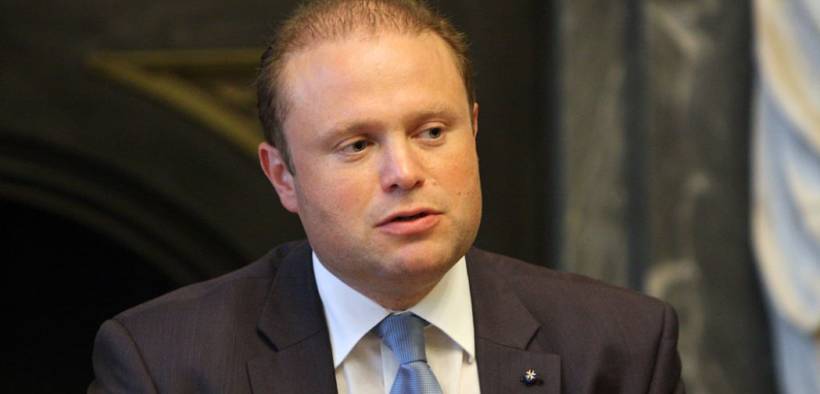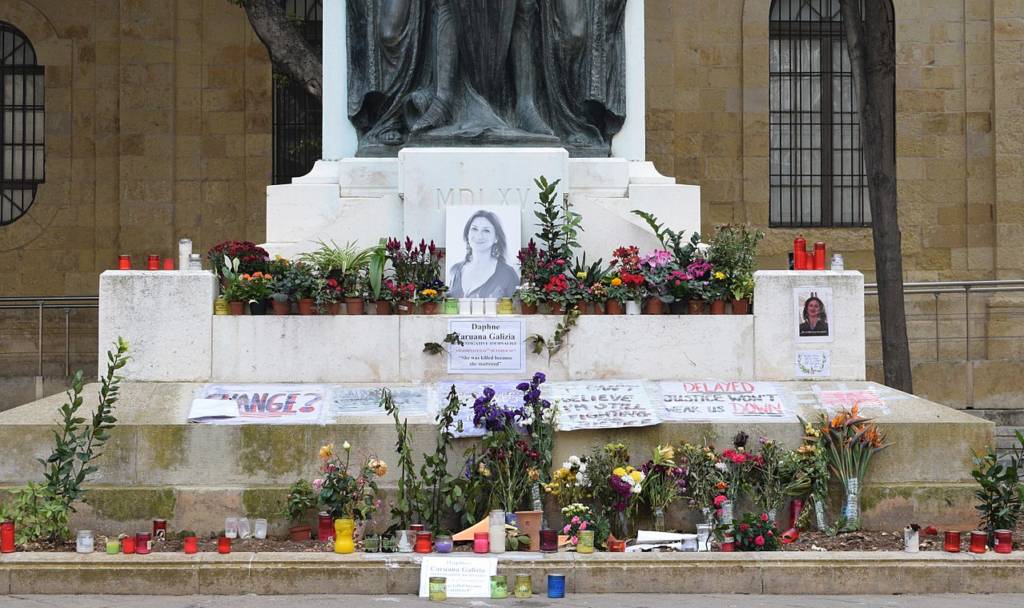Malta PM Resigns After Administration Implicated in Journalist’s Murder

Maltese Prime Minister Joseph Muscat will resign in January after recent news implicating his administration in the role of the 2017 murder of journalist Daphne Caruana Galizia.
More than two years after a car bomb killed famed Maltese investigative journalist Daphne Caruana Galizia, Malta’s Prime Minister Joseph Muscat announced he would resign Sunday night in response to protests that erupted after new revelations implicated members of his cabinet in her assassination.
Caruana Galizia was described as a “one woman Wikileaks” by Politico for her fierce anti-corruption reporting, which often related to the vast network of off-shore tax avoidance and criminal schemes revealed by the Panama Papers. Her murder in October of 2017 brought international attention to the tiny Mediterranean nation denounced as a “mafia state” by the slain journalist’s son.

Memorial to murdered investigative journalist Daphne Caruana Galizia at the foot of the Great Siege Monument in Valletta, Malta. (Photo: Enrique Íñiguez Rodríguez)
After stalling for years, the investigation rapidly accelerated upon the arrest of prominent businessman Yorgen Fenech on Saturday, who tried to escape Malta aboard his yacht before being stopped by authorities. Fenech is suspected of hiring three contract killers to plant the car bomb, but he alleges that members of Muscat’s party were the true architects of the conspiracy.
Muscat resigned later on Sunday as thousands of protesters gathered in the Maltese capital of Valletta. Two members of Muscat’s party suspected of involvement also resigned last week.
“The situation in Malta has consequences for the entire European project,” said Manfred Weber, the German head of the center-right European People’s Party group and a member of the European Parliament.
Critics say the outgoing prime minister repeatedly impeded the investigation to protect members of his party. “Muscat has protected them all this time and defended them again and again, while attacking those who wanted to expose them,” said Weber.
“Muscat sits at the European Council with other prime ministers while his chief-of-staff has been [accused of] being one of the masterminds [of the killing],” Jason Azzopardi, a Maltese MEP, said in a letter to European Commission president Ursula von der Leyen.
Muscat said he would delay his resignation until January to ensure stability. Caruana Galizia’s family responded Sunday to the announcement demanding he forgo delays and resign immediately.
“His continued tenure as prime minister is intolerable to anyone who cares about justice. His role in the investigation into our wife and mother’s assassination is unlawful,” the family’s statement said. “Until he resigns, we will use all legal remedies to ensure Muscat has no further involvement in the investigation and criminal proceedings, other than as a possible suspect.”
17 Black
Fenech told authorities that former chief of staff Keith Schembri, a close friend of prime minister Muscat, was the true mastermind behind the assassination plot. The businessman asked for a presidential pardon in exchange for information about other political figures implicated in the murder.
“All three men had come under withering criticism and personal attack from Ms. Caruana Galizia before she was killed,” reported the New York Times. “Mr. Schembri and Mr. Mizzi owned offshore companies set up to receive money from a mysterious company known as 17 Black that had been registered in the name of Mr. Fenech, the businessman and prime suspect in the murder case.”
In June the Council of Europe named 17 Black in a resolution outlining “fundamental weaknesses” that impeded the investigation, including a litany of corruption allegations against Mizzi and Schembri. The Council mentioned a “highly irregular procedure” in which then-energy minister Konrad Mizzi awarded a 450 million euro “major public contract” to build a power plant to a consortium that included Fenech and an Azerbaijani State energy company.
The Council notes that Fenech owns a “secret Dubai company, 17 Black, that was expected to make large monthly payments to secret Panama companies owned by Dr. Mizzi and Keith Schembri, Chief of Staff of the Prime Minister. 17 Black received large sums of money from an Azerbaijani national and a company owned by a third member of the consortium. Despite being officially informed about the case by the Financial Intelligence Analysis Unit, the police have taken no action against Dr. Mizzi or Mr. Schembri.”
Ms. Caruana Galizia wrote extensively about the shady energy deal and 17 Black, which she alleged was a vehicle for Maltese politicians to receive kickbacks. “The mystery of 17 Black did not die with her, however,” noted the BBC, as “last year a leaked email indicated that it was set to pay Mr. Schembri and Mr. Mizzi’s Panama companies $5,000 (£3,860) a day.”







